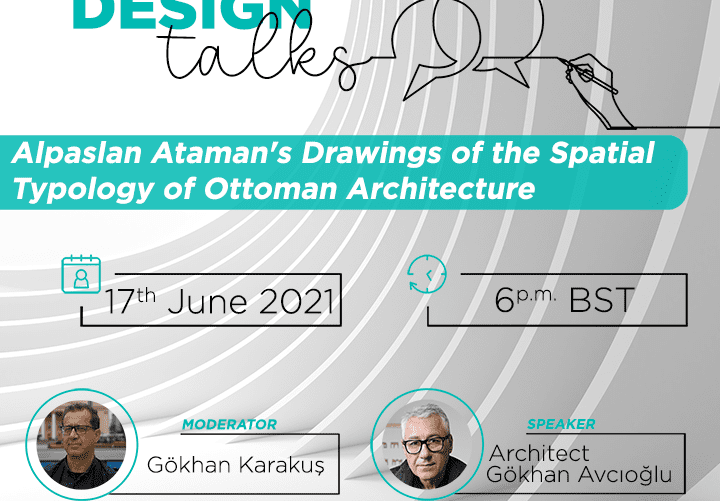Alpaslan Ataman’s Drawings of the Spatial Typology of Ottoman Architecture with Gökhan Avcıoğlu
Yunus Emre Institute in London is delighted to host its new series of online talks moderated by the noted designer, curator and writer, Gökhan Karakuş. This series will try to map how Turkish culture has developed in architectural and design fields over the last two centuries as it attempted to retain its unique cultural values while adapting to global changes. Contemporary figures in design and architecture will be invited to discuss their own work in regard to Turkish cultural heritage as well as their views on their 20th century modernist predecessors. The series’ first guest speaker is award-winning architect Gökhan Avcıoğlu discussing Alpaslan Ataman’s Drawings of the Spatial Typology of Ottoman Architecture on Thursday, 17th of June 2021at 18:00 (BST).
Alpaslan Ataman (1944 – 2020) was an architect, researcher and Intellectual, a crucial figure who connected Ottoman urbanism to our modern world. He provided research in the form of his drawings of Ottoman architecture that analysed the planning and organisation of this history, based on an understanding of spatial typology. Working especially through hand drawings of existing and no longer present Ottoman buildings, his detailed architectural drawings show us the world of architecture and urbanism of Ottoman Istanbul that was an important contribution to contemporary architectural discourse in Turkey. In this talk, Architect Gökhan Avcıoğlu explores Ataman’s “Timeless Architecture” through the geometry of the Ottoman system as it relates to a holistic understanding of architecture in Western Civilization.
Gökhan Avcıoğlu is an award-winning architect and is the principal and founder of GAD – Global Architectural Development. Avcıoğlu was born in Ankara, Turkey in 1960 and completed his education in KSU/BA in Architecture. With projects undertaken across the world, among Avcıoğlu’s most recent award-winning projects are Media City, AKH KNDU Villas, and KUUM Hotel and Residences. A number of Avcıoğlu’s projects have also been short-listed for the Aga Khan Award for Architecture and he has been recognized by a number of different publications and books, including Wallpaper, Surface, NY Times, The New York Post, and Architectural Digest. Avcıoğlu has also been featured in TV programs, including BBC and Channel 4. Since 2001, Mr. Avcıoğlu has been conducting studios and seminars at the Ecole Speciale d’Architecture in Paris, Yildiz Technical University and Istanbul Technical University. He is a member of RIBA, AIA New York Chapter, Chamber of Architects Turkey.
Gökhan Karakuş is a designer, curator and writer concentrating on the intersection of design and architecture. Educated in architecture at Vassar College and Columbia University in New York, he later founded Emedya Design in Istanbul Turkey specialising in digital and computational design. As a writer Karakuş has written for Architectural Review, Architects’ Journal, Wallpaper and Detail as well as Editor of Natura magazine on Architecture and Interiors in Natural Stone. Karakuş currently teaches visual design and architecture at Medipol University in Istanbul and previously was lecturer and guest critic at architecture and design schools such as Istanbul Technical University, Pratt Institute School of Architecture, University of Pennsylvania Stuart Weitzman School of Design, and Politecnico di Milano. Karakuş has curated exhibitions on design and architecture at venues such as the London Design Fair, the London Design Festival, ArchMoscow, Venice Architecture Biennial, Istanbul Design Week and Istanbul Design Biennial.
About the Architecture and Design Talk series:
This series invites contemporary figures in design and architecture to discuss Modernists and their own work engaged in the Continuing Heritage and Transmission of Turkish Cultures and Traditions.
For centuries, the transfer of cultural heritage has been a critical issue in Turkey. Starting with the initial westernising policies of the 18th century in the Ottoman Empire, there developed a series of inflection points on the representation of Turkish culture that continues today well into the 21st century. Notions of cultural identity and heritage became explicit public codes, especially in architecture, as Turkish society underwent radical changes in the process of modernization. As a result, architecture in Turkey is unique in the way that the many concurrent themes of the modernization and westernisation were both negotiated and merged within a very brief period. With East/west, north/south, Europe/Asia, Islam/Christianity, sedentary/nomad, industrial/agrarian, modern/primitive, urban/rural dichotomies, the last 100 years Turkey’s geography has been the site of critical convergences of these basic issues determining ideology, culture and hence architecture.
These inflection points such as post-war globalism, late 20th century economic liberalism, early 21st century global system had their most dramatic appearance in changes on the urban fabric, in cities and in architecture and later in interiors in design in Turkey. The assessment of these changes, a transformation that continues, has not been readily understood outside of Turkey and is the subject of these talks.
To sign up, please visit our Eventbrite

